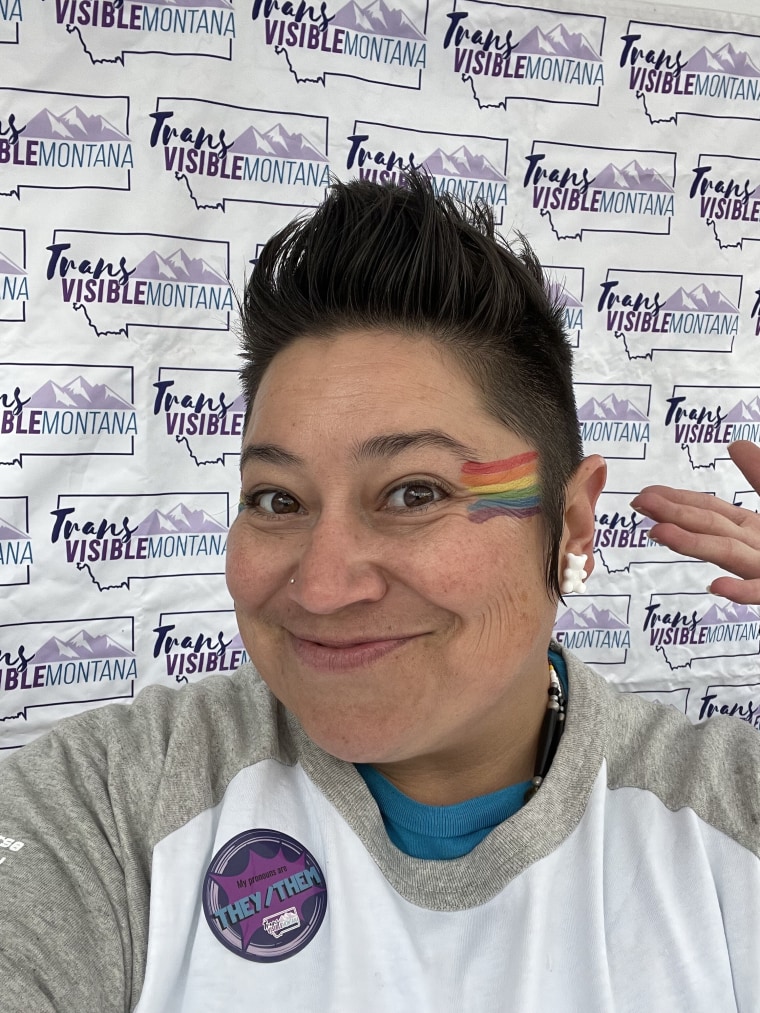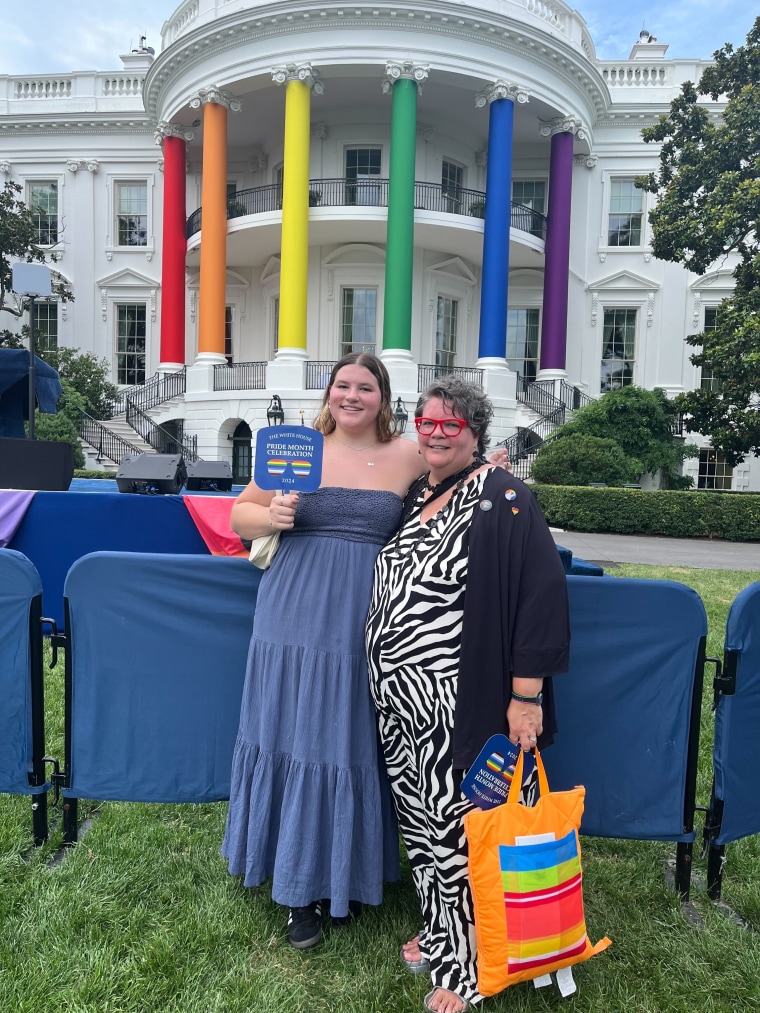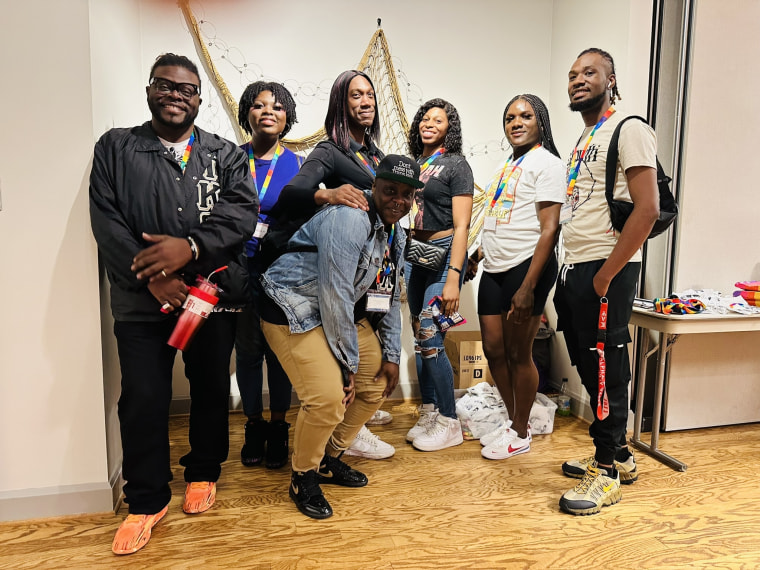Though transgender people make up less than 1% of adults in the U.S., they have taken a central role in the 2024 election.
Republican presidential candidate Donald Trump has embraced anti-trans rhetoric and spent millions on ads targeting trans people and Vice President Kamala Harris’ past support for trans-inclusive policies. At least a dozen speakers at the Republican National Convention in July mentioned gender identity or sexuality negatively in their speeches. And since the beginning of 2023, states across the country have passed more than 100 laws targeting LGBTQ rights, many of them focused on trans minors’ access to gender-affirming health care and sports and restricting LGBTQ topics in schools.
NBC News spoke with a dozen trans people and their families across nine states about their hopes and concerns leading into Election Day. Some are backing Harris, the Democratic presidential nominee, and have plans to leave the state — and, potentially, the country — if Trump wins. Others, including those who plan to vote for Trump, said they are going to stay and organize or protest within their communities regardless of who wins. And some are still conflicted about whom they will vote for, citing objections they have to both Trump and Harris.
Comparing Trump and Harris on trans rights
Trump and Harris have radically different LGBTQ records, with advocacy groups describing Trump’s administration as one of the most hostile toward the community, and particularly transgender people, in history. The administration banned trans people from enlisting in the military, rolled back an Obama administration policy that prohibited discrimination based on gender identity in health care and reversed Title IX protections that allowed trans students to use bathrooms that aligned with their gender identities.
Trump has promised to reinstate his trans military ban and Title IX policy and to bar transition-related care for minors nationwide if he is elected to a second term. The agenda on his website says he would declare that any clinician who provides transgender care to minors would be terminated from Medicare and Medicaid.
Advocates have hailed the Biden-Harris administration as the most pro-LGBTQ in history and have said a potential Harris administration would go even further in protecting gay and trans people. The Human Rights Campaign, the country’s largest LGBTQ rights group, endorsed Harris in July, describing her as “a champion for LGBTQ+ equality for decades.”
However, her record on trans rights has been mixed. In 2014, as San Francisco’s district attorney, she helped make California the first state to ban the so-called gay and trans panic defense, or the use of a victim’s sexuality or gender identity as justification for a criminal action. But a year later, as California’s attorney general, Harris worked to block a trans woman from receiving gender-affirming care in prison (she later said she worked behind the scenes to get the state Corrections Department to change its policy of denying trans inmates such care).
Just last week, Harris received a mixed response to an interview with NBC News when she appeared to avoid answering a question about whether she believes trans people in the U.S. should have access to gender-affirming care. She first said she would follow the law and, when pressed, added, “That is a decision that doctors will make in terms of what is medically necessary.”
‘My existence might be illegal’
In a joint study published last year by The Washington Post and KFF, formerly known as the Kaiser Family Foundation, 42% of transgender respondents said they are Democrats, 26% Democratic-leaning independents, 10% Republicans and 4% Republican-leaning independents.
Most of the trans people who spoke to NBC News about the election said they’ll be voting for Harris, with two saying they’re backing Trump. One of the two, Gina Roberts, was the first trans Republican elected in California after she won a seat on the Valley Center Parks and Recreation Board of Directors and the Valley Center Fire Protection District Board in 2020. Roberts has met both of the candidates: She met Trump in 2016 through her friend Richard Grenell, who was Trump’s acting director of national intelligence, and she met Harris in 2018 to talk about gun rights.
“I look at people that were trans in Trump’s first administration, I said, ‘So, did anything bad happen? Were you thrown in a concentration camp?’ Don’t think so. A lot of that was just rhetoric that was flying around.”
Gina roberts, trump supporter
Though she doesn’t support all of Trump’s policies, she said she’s voting for him because she strongly disagrees with Harris’ stance on gun rights. She also takes issue with Harris over Proposition 47, a California ballot initiative that makes the theft of goods worth $950 or less a misdemeanor rather than a felony. But while the proposition became law while Harris was the state’s attorney general, she wasn’t involved in drafting or passing it and remained neutral on the policy.
“Is he an a——? Yes. Do I wish he would keep his mouth shut? Yes,” Roberts, who now lives in New Mexico, said of Trump. “I honestly wish we had a different candidate. However, I’ve seen what Harris did in California, so there’s no way in heck I would ever support her or the Biden administration.”
Roberts said her problem with how trans issues are discussed in public and by politicians is that the conversation is often dominated by people with extreme positions on either side. She doesn’t agree with all of the policy proposals on Trump’s website regarding trans people. For example, she believes some trans minors should have access to puberty blockers and hormone therapy, and she thinks the majority of Americans don’t care about what bathrooms people are using. She said she ultimately isn’t worried about a second Trump administration.
“One of the things that is being played by both sides, but especially by the Democrats, is the whole victim mentality and getting one side to hate the other side,” Roberts said. “I look at people that were trans in Trump’s first administration, I said, ‘So, did anything bad happen? Were you thrown in a concentration camp?’ Don’t think so. A lot of that was just rhetoric that was flying around.”
However, when she was asked about trans people who weren’t allowed to enlist in the military during Trump’s administration, she said “it’s challenging” to juggle those cases with the majority of people who most likely didn’t see any effects on their day-to-day lives.
Emaline, 31, a trans person living in Orlando, Florida, said she’s backing Harris and is afraid of what a second Trump administration could bring, especially as a trans person living in a state that has enacted several laws targeting LGBTQ people over the last two years.
Emaline, who asked to go by her first name because of concerns over a state policy related to trans teachers, is getting her master’s degree in teaching and currently works in a public middle school. A state law Republican Gov. Ron DeSantis signed in May 2023 prohibits teachers and students from using pronouns, titles and school facilities that don’t align with their birth sexes. A judge temporarily blocked the restriction in April, but only for the teachers who filed the lawsuit.
Emaline said that teachers and students in her school use her correct pronouns and title without issue but that she isn’t allowed to use the women’s bathroom. She’s worried about how a Trump presidency would affect those kinds of policies or her ability to teach, in general.
“It’s scary,” she said. “I’m feeling like every day my existence might be illegal.”
However, some trans people who spoke to NBC News, such as Dandilion Cloverdale, a nonbinary and two-spirit activist living in Missoula, Montana, are conflicted about whether to vote for Harris or to vote third party to “voice my preference for an alternative.”

Cloverdale, who uses they/them pronouns, is the public education lead of TransVisible Montana, a trans rights group. They disagree with Harris on a number of issues, including her continued support for providing funding to Israel given ongoing deaths and destruction in Gaza — an issue that has divided the LGBTQ community over the past year.
Regardless of the election outcome, Cloverdale said, trans people in states like Montana are fighting to access basic rights, such as updated identification documents and gender-affirming health care, and they said those issues have been overlooked in arguments about which candidate could better protect trans rights.
“All of this stuff is already happening for a lot of trans, nonbinary and two-spirit folks,” Cloverdale said. “There are a lot of folks who are getting the health care they can right now because it might not be available soon, getting their names, passports changed, just in case. They’re stocking up on meds and finding out where they can get meds if things do change.”
‘Our problems will still be here’
Half of the trans people who spoke to NBC News said they have considered moving or already plan to move after the election, either to states that have more LGBTQ-friendly policies or outside the U.S. Twenty-six states restrict minors’ access to transition-related health care, and the same number of states prohibit trans student-athletes from playing on the school sports teams that align with their gender identities.
A transgender nurse living in Austin, Texas, said that she and her wife have been talking about moving out of their conservative state for nearly a decade and that their discussions have gotten more serious in the run-up to the election. Texas has passed several laws targeting trans people in recent years, and the nurse said she’s afraid another Trump administration and an increase in anti-trans rhetoric could contribute to violence that could make it unsafe for her to be around her son, whom she shares custody of with a previous partner.
“The overwhelming goal by a lot of these hard-liners is that, yes, they want to ban stuff for trans youth, but they really want to ban the existence of having to see trans adults,” said the nurse, who asked to be anonymous because of fear of retribution from state lawmakers. “That’s the piece that feels particularly scary.”
She said her professional license allows her to work in any state, so she and her wife have identified New Mexico and California as potential options. If the U.S. as a whole no longer feels safe for trans people, she said, she has her eye on New Zealand, where her nursing license is transferable but she would be far away from her son.
North Carolina attorney Katie Jenifer has an extensive plan for where she and her 17-year-old transgender daughter, Maddie, will go if Trump wins another term.

She has friends in Germany, Spain and Amsterdam who have all said Maddie can live with them if Trump wins and implements any of his proposed policies targeting trans people, such as prohibiting access to transition care for minors nationwide. If their family feels they have to live outside the country indefinitely, Jenifer said, they would move to Malta, a progressive island country in southern Europe where they could be eligible for citizenship in five years.
“I understand that we are coming from a place of privilege to be able to have these plans for Maddie, to be able to move her out of state or out of the country,” Jenifer, 52, said. “My fundamental reason for my being is to protect this child, and I can’t in good conscience stay and hope that we can make it work if I have an option to get her out and to safety.”
Maddie is frustrated that she’s not yet old enough to vote in an election in which trans people — and particularly trans women and youths — have become central to campaign ads and trail speeches of some Republican candidates, including Trump. “All I can do is just tell people to go vote and try to educate them on what’s, in my opinion, right,” she said.
Some of the trans people who spoke to NBC News don’t plan to leave regardless of what happens in their states or in the country.

TC Caldwell, the executive director of The Knights and Orchids Society, or TKO, an organization based in Selma, Alabama, that provides health and wellness services to Black trans people, said many of the people it serves are focused on surviving, so moving isn’t an option for them.
“Our work does not start or stop with who’s in office or legislation, because our problems will still be here,” Caldwell said. “We need to make sure our people are safe under anyone.”




